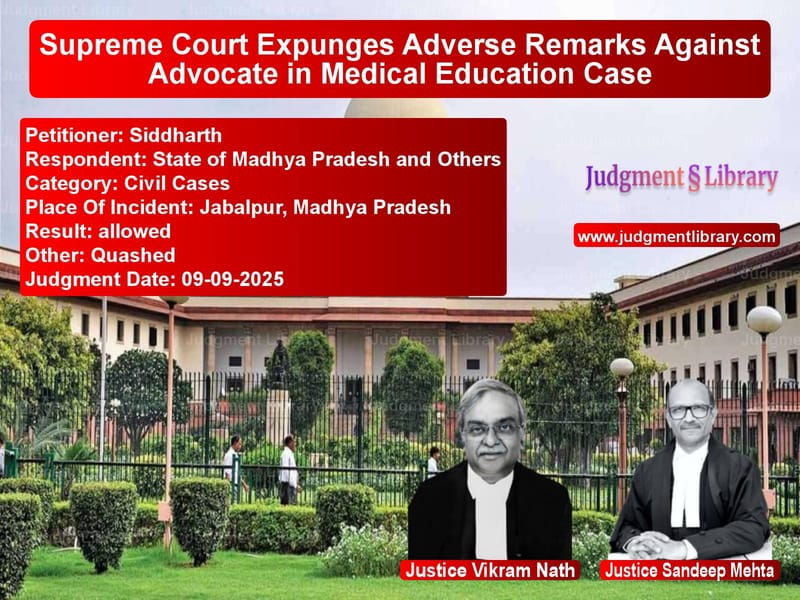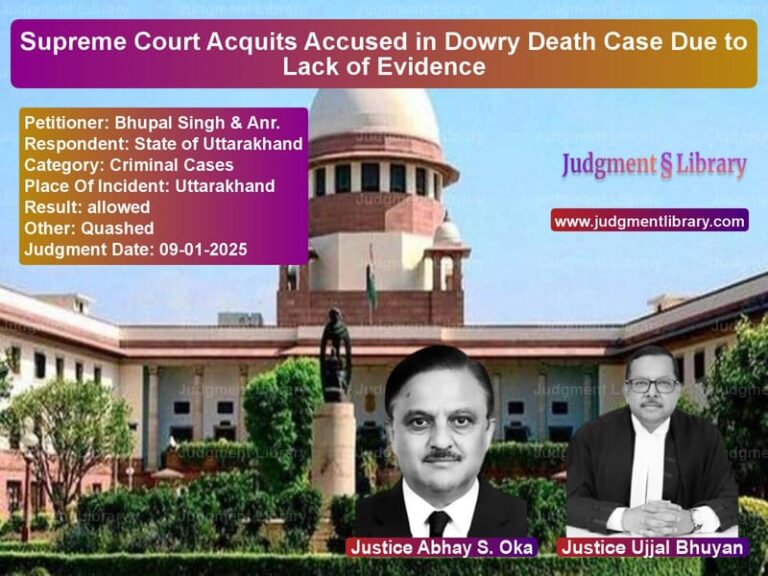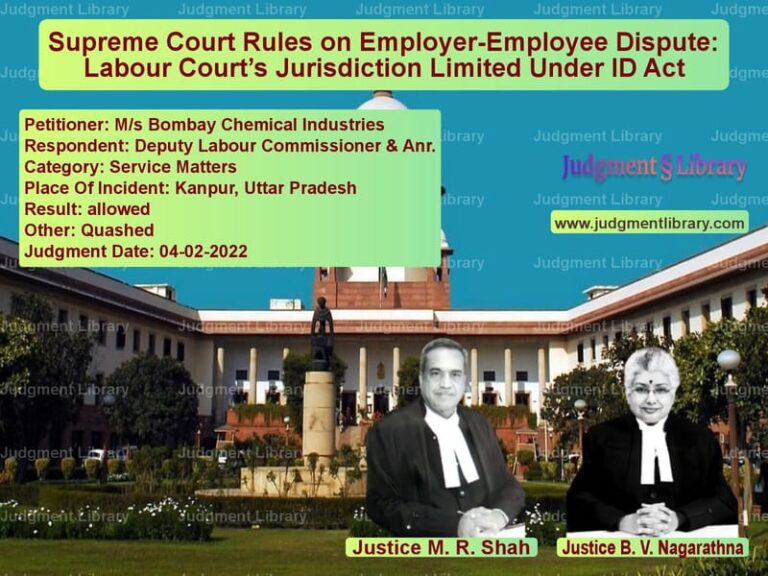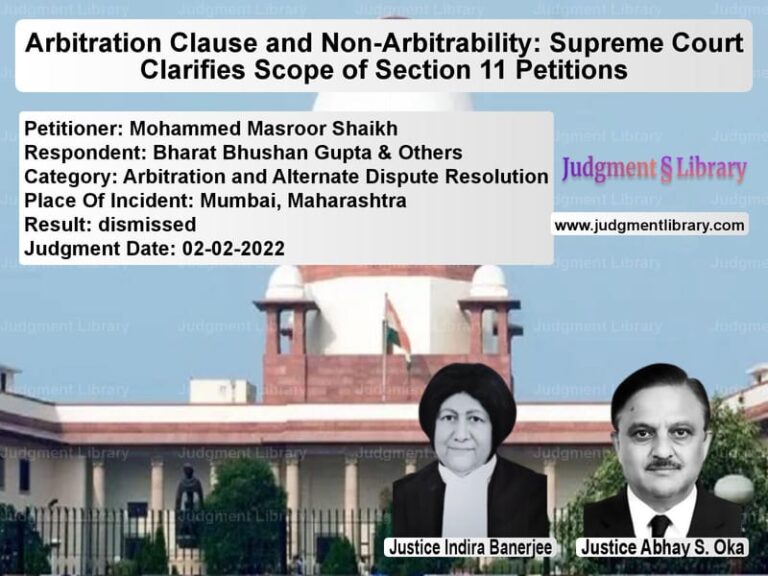Supreme Court Expunges Adverse Remarks Against Advocate in Medical Education Case
In a significant ruling that underscores the importance of judicial restraint when commenting on lawyers’ conduct, the Supreme Court of India recently expunged adverse remarks made by the Madhya Pradesh High Court against an advocate. The case involved Siddharth Gupta, a lawyer who had been reprimanded by the High Court for what it termed “professional impropriety” while representing petitioners in a medical education matter.
The controversy began when Gupta filed and argued Writ Petition No. 6228 of 2022 before the High Court of Madhya Pradesh at Jabalpur. During the proceedings, the Division Bench of the High Court made strong observations about Gupta’s conduct in its final order dated April 6, 2022. The court specifically noted that Gupta had relied upon a Supreme Court decision in the case of Index Medical College Hospital & Research Centre but failed to disclose that there was no challenge made to a Coordinate Bench decision dated December 15, 2020, rendered in Writ Petition No. 18699/2020. In this earlier case, the constitutional validity of amended Rule 6 of the Rules of 2018 had been upheld.
The High Court expressed its displeasure in clear terms: “Before concluding it would be appropriate to comment upon the conduct of learned counsel for petitioners which borders on professional impropriety. Learned counsel for petitioners – Shri Siddharth Gupta while relying upon the decision of the Apex Court in the case of Index Medical College Hospital & Research Centre (supra) failed to disclose that there was no challenge made to the Coordinate Bench decision dated 15.12.2020 rendered in Writ Petition No. 18699/2020 whereby the constitutional validity of amended Rule 6 of the Rules of 2018 (as impugned herein) was upheld. The impression given to the Court by Shri Siddharth Gupta, learned counsel for petitioners was that the entire judgment rendered on 15.12.2020 including the one rendered in Writ Petition No. 18699/2020 (Arushi Mahant and others Vs. State of M.P.) was upturned by the Apex Court. In all fairness, learned counsel for petitioners ought to have informed this Court in the very beginning before relying upon the decision of the Apex Court in Index Medical College Hospital & Research Centre. Unfortunately, this was not done. This Court came to know about this fact only when the counsel for State Shri Ashish Anand Bernad pointed this out. Accordingly, this Court records its displeasure about the conduct of counsel for petitioners – Shri Siddharth Gupta.”
These observations cast a serious aspersion on Gupta’s professional conduct and prompted him to approach the Supreme Court seeking expunction of these adverse remarks. Represented by senior counsel Shri Siddharth Bhatnagar, the appellant tendered an unconditional apology for any mistake committed while presenting and arguing the writ petition before the High Court. More importantly, the counsel argued that Gupta was not engaged or involved as counsel in the connected Writ Petition No. 18699 of 2020 titled “Arushi Mahant & Ors. vs. Medical Education Department & Ors.” and thus, any omission on his part was bona fide with no intention to mislead the court.
The Supreme Court bench comprising Justices Vikram Nath and Sandeep Mehta heard the matter and noted that despite service, no one had entered appearance on behalf of the respondents. After considering the submissions and examining the impugned order, the court delivered a thoughtful judgment that balanced the need for maintaining professional standards with the principle of giving lawyers the benefit of doubt in complex legal matters.
In their ruling, the Supreme Court judges made several important observations about the case. They stated: “Having considered the submissions advanced at bar and after going through the afore-quoted para of the impugned order rendered by the High Court, we feel that the adverse observations made against the Advocate (supra) could have been avoided in the facts and circumstances of the case.” This statement reflects the Supreme Court’s view that judicial comments on lawyers’ conduct should be measured and reserved for cases where intentional misconduct is clearly established.
The court further noted: “It is the specific case of the appellant herein that he was not an Advocate engaged in the case of Arushi Mahant (supra) and thus, the possibility of the fact regarding the decision rendered in Writ Petition No. 18699 of 2020 not having been challenged any further may have bona fide escaped the notice of the appellant.” This acknowledgment of the possibility of a genuine oversight rather than intentional misconduct formed the crux of the Supreme Court’s reasoning.
Based on this analysis, the Supreme Court concluded: “In this backdrop, we are of the opinion that the adverse observations supra made in Para 7 of the impugned order deserve to be and are hereby expunged so far as they relate to the appellant.” The court also quashed and set aside the High Court’s order dated January 5, 2024, which had dismissed Gupta’s application seeking modification of the final order to the extent it recorded adverse remarks about his conduct.
This judgment highlights several important principles in the administration of justice. First, it reaffirms that lawyers should be given the benefit of doubt when there’s a possibility that any lapse was unintentional rather than malicious. Second, it establishes that courts should exercise restraint when making adverse remarks against legal professionals, ensuring that such comments are reserved for cases of clear and intentional misconduct. Third, it demonstrates the Supreme Court’s role as a protector of legal professionals’ reputations when lower courts may have overstepped in their criticism.
The case also sheds light on the complex nature of legal practice, where lawyers often have to navigate numerous related cases and legal precedents. In such scenarios, the Supreme Court recognized that some information might genuinely escape a lawyer’s notice, especially when they were not involved in the related cases. This pragmatic approach acknowledges the practical challenges faced by legal practitioners while maintaining the high standards expected of the profession.
Furthermore, the judgment underscores the importance of the expunction power exercised by superior courts. When lower courts make remarks that are potentially unjustified or excessively harsh, the Supreme Court can intervene to protect the reputation and professional standing of lawyers. This ensures that legal professionals can perform their duties without fear of unwarranted criticism that could damage their careers.
Read also: https://judgmentlibrary.com/supreme-court-upholds-property-rights-in-land-dispute-case/
The Supreme Court’s decision also serves as a reminder to all courts about the significant impact that judicial remarks can have on a lawyer’s professional life. While courts certainly have the authority and responsibility to maintain decorum and professional standards in their courtrooms, they must exercise this power judiciously and with careful consideration of the circumstances.
In the broader context of legal ethics and professional responsibility, this case illustrates the balancing act that courts must perform between upholding high standards of legal practice and recognizing the human element in legal representation. Lawyers, like all professionals, can make genuine mistakes, and the justice system must have mechanisms to distinguish between inadvertent errors and intentional misconduct.
The Supreme Court’s ruling ultimately strengthens the legal profession by providing a safeguard against potentially unfair criticism while still maintaining the authority of courts to address genuine instances of professional misconduct. It reinforces the principle that the relationship between the bench and the bar should be based on mutual respect and understanding, with both working together to ensure the proper administration of justice.
This case will likely serve as an important precedent for future matters involving adverse remarks against legal professionals, guiding lower courts in their approach to dealing with perceived lapses in lawyers’ conduct. It emphasizes that while maintaining professional standards is crucial, the reputation and dignity of legal practitioners should be protected against unwarranted observations that could have long-lasting consequences on their professional lives.
Petitioner Name: Siddharth.Respondent Name: State of Madhya Pradesh and Others.Judgment By: Justice Vikram Nath, Justice Sandeep Mehta.Place Of Incident: Jabalpur, Madhya Pradesh.Judgment Date: 09-09-2025.Result: allowed.
Don’t miss out on the full details! Download the complete judgment in PDF format below and gain valuable insights instantly!
Download Judgment: siddharth-vs-state-of-madhya-prad-supreme-court-of-india-judgment-dated-09-09-2025.pdf
Directly Download Judgment: Directly download this Judgment
See all petitions in Legal Malpractice
See all petitions in Other Cases
See all petitions in Judgment by Vikram Nath
See all petitions in Judgment by Sandeep Mehta
See all petitions in allowed
See all petitions in Quashed
See all petitions in supreme court of India judgments September 2025
See all petitions in 2025 judgments
See all posts in Civil Cases Category
See all allowed petitions in Civil Cases Category
See all Dismissed petitions in Civil Cases Category
See all partially allowed petitions in Civil Cases Category







